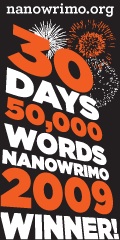…but I’m now posting at HagFest. Drop by and I’ll tell you why.
Jane Austen and (eek!) modern moral instruction
December 4, 2009 The WSJ has a wonderful article by James Collins on Jane Austen, which contends that “to write brilliant novels was not Jane Austen’s foremost goal: What was most important to her was to provide moral instruction.”
The WSJ has a wonderful article by James Collins on Jane Austen, which contends that “to write brilliant novels was not Jane Austen’s foremost goal: What was most important to her was to provide moral instruction.”
E-gad! Moral instruction? I thought she was all about romance! How perfectly embarrassing to the modern reader who, according to Collins, “sort of blips over the moralizing sections and tells himself that they don’t really count. It is possible to ignore this aspect of her work, just as it is possible to discuss a religious painting with hardly any reference to the artist’s religious intent. But this seems absurd: Ignoring a writer’s central concern is a strange way to attempt to appreciate and understand her.”
Certainly, the morality of some of her characters is their most maddening — and endearing — aspect. I want to throttle Anne Eliot in “Persuasion” as she loyally listens to that dreadful Lady Russell’s disparagements of the lowly Captain Wentworth while the couple burns with love and longing. I find that Elinor’s tightly held “Sense” in denying herself the company of the already-promised Edward compared to Marianne’s reckless “Sensibility” over the faithless Willoughby makes Elinor look all buttoned up and frustrated — the classical spinster, like her creator.
But, as Collins says, Anne and Elinor can best be understood in the context of their — and their author’s — time, which enforced heavy constraints on women. Men like Wickham and Willoughby could be complete cads and still have a place in society, but their female victims couldn’t. Can’t argue with that.
As for life in the 21st century, I admit that, after a day on the Internet checking in on major media outlets (which is actually part of my job), I crawl home into my book nook and find in Austen and her world a happy retreat. Social-climbing couples crash White House galas, serial adultery has become the rule among the glitterati, snark is the hot new form of discourse, continuing corruption on an almost laughable scale plagues business and government, and tales of encroaching poverty and personal collapse rival anything Dickens ever wrote. ‘Twas ever thus, I know, but elements of modern society seem hell-bent on finding new acts of escalating outrageousness, mostly for purposes of self-promotion. (Don’t get me started on Adam Lambert…)
Collins, in the WSJ article, seems to agree:
Perhaps Austen’s strictness is very old-fashioned, but anyone can find merit in the concepts of honor, duty, and obedience. Those strings have gone so slack that there’s nothing wrong in their being tightened by a sympathetic reading of this aspect of Austen; they will loosen again soon enough.
I would argue that it is this very morality that has kept readers across the centuries so deeply attached to Austen’s works — along with her sharply drawn characters, who are so often defined by their morality, or lack of it.
My surest proof of that would be the Bennet sisters, whose personal responses to the moral challenges of their time form an almost-perfect scale, from the meek, long-suffering Jane on down to the reckless libertine Lydia, with the savvy Elizabeth in the middle. We resonate to all those tones. The extremes are equally irritating, and we look for some sort of resolution. In short, we want to be Elizabeth — at least I do, unless I could be Darcy, with his 50,000 a year that gives him the leisure and the means to set everything right.
So which is it? Moral instruction, or great characters and romance? Can you separate them? Does it even matter? I just know I’m going to keep on reading — and savoring — Jane Austen.
My (not so) Great American Novel
December 2, 2009 If anyone out there is still listening, I apologize for my eight-month absence, but I’ve finally given birth (prematurely, I might add) to my first novel thanks to nanowrimo, a dandy little exercise in pain, humiliation, self-motivation and the limitations of caffeine.
If anyone out there is still listening, I apologize for my eight-month absence, but I’ve finally given birth (prematurely, I might add) to my first novel thanks to nanowrimo, a dandy little exercise in pain, humiliation, self-motivation and the limitations of caffeine.
Bottom line, it meant tapping out about 1,700+ words a day during the entire month of November, which is complicated by the fact that it is my second-busiest month of the year at work and full of other friendly distractions, like Thanksgiving. I spent almost the entire month about 2,000 words behind (you can track your progress on the site), but, thanks to some marathon sessions over the long weekend, I managed to finish a day early and several words over the 50,000-word goal (instead of a day late and a dollar short, as is my wont).
I admit I hesitated at signing up, at committing to having a short novel (and 50k is short) by the end of the month. I have rooms full of unfinished projects, piles of yarn and fabric and paper and books, with two abandoned master’s degrees lodged in there somewhere. The Spouse just rolls his eyes when I announce a new goal. But I really wanted to do this. I wanted this off my Life List. And I somehow managed to pull it off.
It is, of course, my roman à clef, my thinly veiled autobiography (well, maybe 30 percent of it anyway), which Maud Newton (who is attempting a similar feat in her own first novel) in a well-timed blogpost suggests that we all have to get out of our systems before we can do any REAL writing. As a measure of what constitutes real writing, Maud leaves it to her hero, Mark Twain: “A successful book is not made of what is in it, but what is left out of it.”
Wanna read it? Well, you can’t. This baby is UGLY. It isn’t even close to being done. There’s even a bunch of stuff that I’ve got to get rid of, little stories and anecdotes that pleased me at the time but don’t do anything to move the plot forward. In fact, the more autobiographical parts are the least interesting. I was at my best during November when I sat down and just let the characters loose, when I was able to get out of my own way, as Jane puts it. For a few glorious moments, it actually got to be a little Zen.
I hope to have a full draft by the end of December, and then I’ll start the real rewrite, including a bunch of research, fact-checking and some field trips.
I’ll definitely do it again. Next November, I’ll issue a call for y’all to join me.
New site alert: Doublex.com
May 12, 2009Salon Slate, one of my long-time favorite Web conglomerates, is beta-testing a new site, doublex.com, for us double exes. (No, not dress size. Us women. Any url with a capital X in it is probably a porn site, eh?) It has a rather thought-provoking, not entirely positive essay on Elizabeth Edwards’ public humiliation and her reaction to it, as well as another essay on why the snarky Jezebel.com is bad for women. Worth looking at.
Thanks for the correction, Jane. I can’t keep up with myself sometimes.

On getting fired, and other life lessons
May 11, 2009 The Wall Street Journal today referenced a mental_floss column by Ethan Rex on successful celebrities who survived, even flourished, after being fired, including, of all people, Jerry Seinfeld:
The Wall Street Journal today referenced a mental_floss column by Ethan Rex on successful celebrities who survived, even flourished, after being fired, including, of all people, Jerry Seinfeld:
Remember the ABC sitcom Benson? Seinfeld undoubtedly does. Early in his career he had a small recurring role as a mail boy on three episodes of the show from 1980-81. One day he showed up at work for a read-through, but he couldn’t find a script with his name on it. After Seinfeld asked what was going on, an assistant director told him he’d been fired from the show, but nobody had remembered to tell the young comedian. A humiliated Seinfeld trudged out and decided he was through with sitcoms unless he could get more control over the creative process. As you might have heard, he was pretty successful once that eventually happened.
Other famous firees included Michael Bloomberg, Rainn Wilson, Howard Stern (You think?!) and Robert Redford.
I was fired once. From my first real job. At age 16. We lived near my dad’s pharmacy on a busy state road, and there was a A & W Root Beer Drive In across the street. I thought the carhops — all girls — looked cute running back and forth from the tiny building to the cars with frosty mugs and little baskets of french fries, so when I turned 16, I applied, citing my close proximity to the drive-in as a hiring plus. I got the job. I was thrilled.
Major life lesson: In this little cosmos, the cooks and the night manager — all guys — ruled. And one of the first rules was that all “new girls” got hazed. They made my life there a living hell, barking at me, mixing up my orders, bad-mouthing me to the rest of the staff, and, worst of all, stealing money from me, which is what got me fired after a mere two weeks. It was devastating. I had been a golden girl up until then, good with people, successful with most everything I tried. And here I was, out in the job market, the real world, and I was a miserable failure. The owner couldn’t just let me go, he had to spend nearly a half an hour detailing all my inadequacies and questioning whether I would ever make it as an employee anywhere. (Ironically, the drive-in went bust not too many years later. I wasn’t sorry.)
After enduring his lecture, it was a long walk home. I cried my little teen-aged eyes out. I was convinced at the time that it was all my fault, and it was humiliating having to tell my family and friends that “it just didn’t work out.” It took several months for me to put it all together in my head, and then I got ANGRY. And I’m still a little angry about it. (To his credit, one of the more menacing cooks later told a friend that he felt really bad about what had happened and hoped that I didn’t hate him. I don’t think their hazing had gotten anyone fired before.)
It took me two years to work up the nerve to apply for another job. But I was good at that job, and I’ve been good at every other job I’ve held since then. Most of the men — and women — I have worked with have been steady, genuine people, and I’ve tried to be transparent and sincere. But I’ve always had my radar up, trying to nose out the hazers, the undercutters, the behind-your-back smirkers. When I’ve discovered whatever rock they’ve been hiding underneath, I’ve confronted them (admittedly with mixed results), made some personal adjustments (like removing myself from their team) or gotten out.
So, like Seinfeld, maybe my getting fired was ultimately a good thing. But I don’t think I could ever convince that good-hearted but devastated little 16-year-old of that probability.
Twitter tutorial
May 6, 2009The NYTimes has a great Twitter tutorial today. I learned — and implemented — several features from it. Despite all the doom-and-gloomers, I don’t think Twitter is going away any time soon. It’s too convenient and accommodates our rapidly diminishing attention spans. If you can’t say it in 140 characters or less, nobody’s listening!

A foolish expectation of privacy?
May 1, 2009 Msmeta here, poking her head above ground to see if it’s spring yet — oh, wait. That already happened. Way back in February. Which is about how long since I’ve posted regularly. Okay (she said, rubbing the grit out of her eyes), here goes:
Msmeta here, poking her head above ground to see if it’s spring yet — oh, wait. That already happened. Way back in February. Which is about how long since I’ve posted regularly. Okay (she said, rubbing the grit out of her eyes), here goes:
I have a plethora of lame excuses for not spilling my guts not posting regularly, most having to do with work, Facebook, work, record snowfalls, work, family issues, blah blah blah. But if you tied me down and put bamboo shoots under my fingernails (or even offered me a Coke with crushed ice, I’m SO easy) I would have to confess that I’ve developed a strange little niggling feeling between my shoulder blades, an uneasiness, a reluctance that I can best express by saying that I’ve been feeling, well, overexposed, vulnerable, too “out there.”
I’ve talked about my penchant for anonoblogging in a previous post, and recently had an interesting, almost uncomfortable response. The reader said it took him only 10 minutes to discover my real identity by following the various breadcrumbs I’ve left throughout cyberspace. So much for hiding in plain sight. (Don’t bother trying to find me. I’m not that interesting. Really.) I think I somehow knew I was discoverable, but it tweaked me a bit nonetheless.
Which is probably why Nell Boeschenstein’s encounter with the limits (or lack thereof) of Internet privacy was so interesting to me. In today’s issue of The Rumpus, an unusual little literary way station on the Web, she tracks how her very personal contribution to a Web site found its way into a very public art exhibit at the Museum of Modern Art, which crossed some definite boundaries for her. Like her, the people who posted to that site:
…were looking for something, and their words and their faces and their desires and their loneliness were being put on display on the wall of a major museum without their permission or knowledge. On the one hand, this was found art; on the other hand, was it? On the one hand, these people had put this information onto the Internet themselves and had no legal expectation to privacy; on the other hand, the piece seemed to take advantage of naïve people who didn’t understand what little ownership they have over the information about themselves available on the Internet. On the one hand, information is taken from the Internet all the time and reprinted in different contexts; on the other hand, faces and emotions and private lives on a museum wall take appropriation to a whole new level. The [original] project seemed kind to the idea of loneliness, yet it seemed to disregard the actual people to whom that loneliness belonged.
Ouch. And she only found out about it because she happened to walk into MOMA and trip over the exhibit. (Her account is a bit long but worth reading.)
Do we have any expectation of privacy out here? Did I sign my rights away when I logged onto WordPress that first time? My posts are never particularly salacious or scatalogical, but could I provoke some unwanted interest just by being here?
I know I’m going to think twice before I contribute to anyone else’s site from now on.
I’ve regained my will to live
April 1, 2009The Brothers Weinstein — those uber-schlumpy fatshionistas — have finally settled their lawsuit with NBC/Bravo, clearing the way for Project Runway to sashay on over to Lifetime, a move that some fans think will be the death of the series. (Bravo = cool, Lifetime = not so much…)
Actually, I’m more concerned about the status of Tim “Make It Work!” Gunn. His genuine concern for the designers is one of the most heartfelt aspects of the show, and his insights are terrific. Heidi is just frakkin’ annoying.
Anyway, I can now exhale. This bit of good news comes just as I’m trying to come to terms with life without Battlestar Galactica. (My tastes, it appears, are catholic.)
Global recession
March 19, 2009This photo essay from the Boston Globe, courtesy of the always-interesting Nancy Nall, cries out louder than most news stories I’ve read about the recession and its global impact. I was particularly pained by the empty Rocky Mountain News offices and a technicolor wasteland of newspaper vending machines. Having spent a lot of my life in newsrooms, which are rarely quiet or empty, those were particularly poignant for me. (It would appear I’m already deadened to the sight of entire families living out of hotel rooms…)
Are we really just a few up days on the Dow from reversing the downturn? If we are, will we have learned anything?



